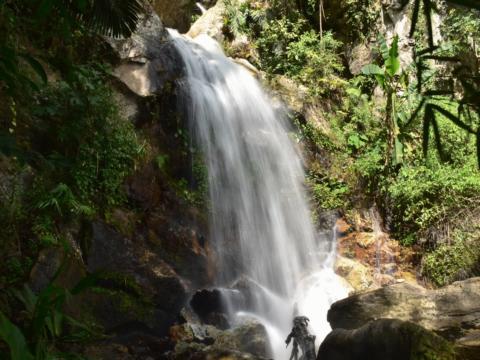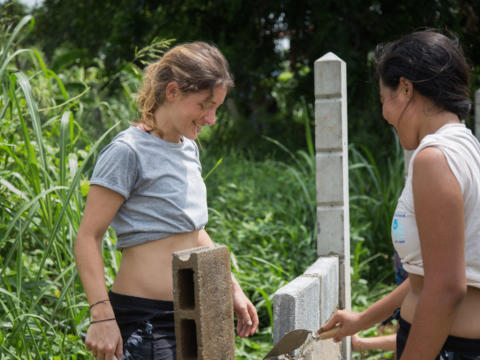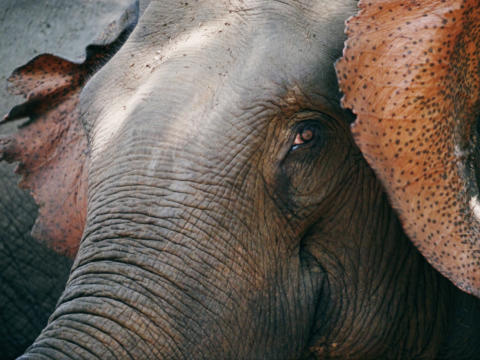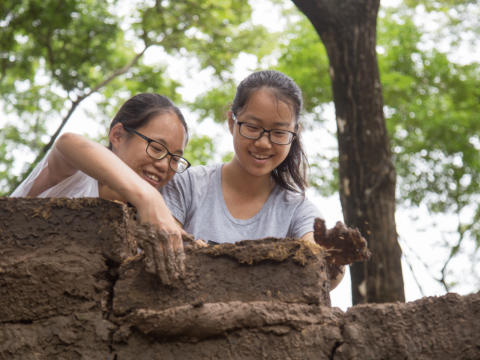Only 360€ per week!
Hua Hin Environmental Conservation
Hua Hin - Thailand
Want to know what it's like to participate in an Environmental Conservation effort? Roll up your sleeves and work alongside local farmers at a mangrove nursery.
Your program starts in Hua Hin – a lively fisherman-town and popular tourist destination. Your role will vary depending on the current need of the tree nursery. Your responsibilities may involve preparing the seed and soil, watering the plant, nursing and planting the mangroves.
Program Description
Welcome to Hua Hin, a spectacular city that boasts one of Thailand’s most popular beach destinations for locals and Expats alike. Your program here as a keen environmentalist will start with a visit to a local Mangrove Ecosystem Learning Centre where you will foremostly take part in many discussions regarding the awareness of Thailand’s deep environmental issues.
In this endeavour, you will work at a local mangrove nursery for 2 hours starting from 9:30 to 11:30. This placement is the main nursery that produces young mangrove plants for the local community. Your responsibilities may involve preparing the seed and soil, watering the plant, nursing the plant and planting the mangroves. A local farmer and coordinator will be there to provide knowledge and show participants step by step from how/where to collect and sort mangrove pods to all the tips that they need to know about how to plant and nurse mangrove adequately.
In addition to meaningful hands-on work to improve the sustainability of the community, such as cleaning up beaches or local communities, creating garbage bins, washing and sorting garbage, you will also be heavily engaged in the learning aspect of researching, planning and educating the local community members and children with regards to the importance of sustainable environmental practices. In order to create awareness and encourage environmental conservation among local people and students, you will be presenting them lectures and training sessions on practical topics such as recycling in the home, reducing one’s carbon footprint, how to separate waste properly, broader topics like the effects of climate change and the need for environmental concern. An English-speaking coordinator will be there to support and help you out with any language barriers.
Aims & Objectives
- To educate younger generations on the importance of environmental conservation
- To increase community awareness of environmental concerns
- Assist the community project staff by providing an extra hand
Schedule
Monday
- Breakfast at the Centre
- Visit Sirinart Rajini Ecosystem Learning Centre to learn about Pran Buri communities and mangrove ecosystem
- Lunch
- Beach/Local Community Clean Up: collecting, washing and sorting garbage
- Dinner at the Centre
Tuesday
- Breakfast
- Working at Local Mangrove Nursery
- Lunch
- Beach/Local Community Clean Up: collecting, washing and sorting garbage
- Dinner at the Centre
Wednesday
- Breakfast
- Working at Local Mangrove Nursery
- Lunch
- Beach/Local Community Clean Up: collecting, washing and sorting garbage
- Dinner at Centre
Thursday
- Breakfast
- Working at Local Mangrove Nursery
- Lunch
- Lesson about Environmental Conservation
- Dinner at Centre
Friday
- Breakfast
- Working at Local Mangrove Nursery
- Lunch
- Lecture about Environmental Conservation at Local Community
- Dinner at Centre
Note: This schedule can be changed and/or amended depending on weather conditions, local conditions and unforeseen circumstances.
Participant Criteria & Requirements
Standard Requirements
Minimum age: –
Maximum age: –
Minimum English level: Basic
CRB required: On Signup
Passport copy required: On Signup
Resume copy required: On Signup
Required qualification: None
Additional Requirements
There are no further requirements for this program.
Additional Equipment
There are no further requirements for this program.
Location
Located just 280 kilometers southwest of Bangkok, Hua Hin is one of Thailand’s most popular beach destinations for locals and Expats alike. It is convenient and ever developing because it is where the city meets the sea. Here you will find scrumptious seafood, lively markets, never-sleeping bars, long beaches, and palm tree-decorated landscapes which have turned this former fishing enclave into a what is now a bustling town, brimming with anything and everything a visitor, tourist, or traveler could ever want!
About the Accommodation
Our center is located in the hilly countryside of Prachuap Khiri Khan province amidst green surroundings. The accommodation consists of spacious rooms. There is a common area with a refrigerator, hammocks and a large communal swimming pool for you to chill.
Food Arrangements
All the meals served inside the accommodation are homestyle, vegetarian-friendly and you can expect that they will be typically Thai, including plenty of rice or noodle dishes with vegetables and occasionally some meat will be provided as well, along with seasonal fruits for dessert.
While we do our best to accommodate our participants, what we provide for most meals is local cuisine. If you are a picky eater, have dietary restrictions, or if you think that you will not be satisfied with the local dishes provided, you might want to consider supplementing our menu with your own western type foods and snacks that are more to your liking. From our accommodation and you can use our bikes to ride to a few convenience stores nearby.
Please keep in mind that refrigerator space is limited and to prevent insect infestation open food items are not allowed in the rooms.
Facilities
Most of your day will be spent in Hua Hin city center, where all amenities can be found.
Activities & Events
Tuesday Evening
You will go to the night market in Hua Hin city. Try some of the delicious local food that is freshly cooked and instantly served to you. Taste a variety of inexpensive street food.
Wednesday Evening
You will go to the night market in Hua Hin city. Try some of the delicious local food that is freshly cooked and instantly served to you. Taste a variety of inexpensive street food.
Friday Evening
You will go to the Cicada Market, a colorful night market offering freshly cooked food from different shopkeepers. Look around the many art exhibitions, see the local handmade products and souvenirs which are very attractive and listen to live music featuring local artists.
Sights & Surroundings
Hua Hin is a lively fisherman-town and popular tourist destination, and it has a lot to offer besides just sunbathing, snorkeling and swimming at its golden beaches. Not only are there plenty of seafood restaurants and other eateries to choose from, but visitors can also enjoy golf, spas, shops, markets (including a popular night market), and Hua Hin’s Vana Nava water park.
You might also consider visiting Khao Tekiab, a mountain at the end of the beach with a temple atop that overlooks the beach.
Hua Hin is also surrounded by beautiful national parks and you might decide to go slightly further afield to explore the likes of the Pa La-U Waterfall, located 60 km west of Hua Hin in the south side of the Kaeng Krachan National Park. Alternatively, 45 km to the south of Hua Hin is the mystical Phraya Nakhon cave for the more adventurous!
Transportation
From this location we provide free transport to your next program at the following location(s):
- Akha Village Chiang Rai
- All around Thailand
- Around Thailand
- Kaeng Krachan
- Kanchanaburi
- Mae Sot
- Singburi
- Suphan Buri
- Train Track Northern Thailand
- Trunk to the South
- Umphang
- Udon Thani
- Wang Nam Khiao
Quick Facts
Name: Kingdom of Thailand
Population: 67 million
Capital: Bangkok
Language: Thai
Currency: Baht (THB)
Time zone: ICT (UTC +7)
Country Information
From trekking in the beautiful mountains of the north to enjoying the glorious beaches in the south and experiencing the hustle and bustle of the metropolis that is Bangkok, Thailand is certainly not a country that lacks variety.
Whilst it really is at the heart of Southeast Asia, bordered by Myanmar, Laos, Cambodia and Malaysia, its cultural identity remains very unique. As the only country in Southeast Asia to avoid European powers, the Thai are proud to refer to themselves as ‘The Land of the Free’ and many tourists might also know it as ‘The Land of Smiles’ due to its friendly people.
Climate
The majority of the country is home to a tropical savanna climate which consists of wet and dry seasons of a roughly equal length. The climate can be divided into three distinct seasons:
- Dry season: November – end of February. During this period, precipitation is at its lowest but so are the temperatures. This said, ‘low temperatures’ are of course relative and the difference is not in fact very different at all in the South. It is only if you will be visiting the northern mountains that you might need to bring some warmer clothes as temperatures can fall as low as 5°C. This period is, not surprisingly, the most popular time to visit Thailand and tourism peaks around Christmas and New Year as well as Chinese New year. Flights and accommodation at this time can be more expensive.
- Hot: March to June. During this time Thailand reaches its hottest temperatures (as high as 50°C).
- Rainy: July – October. This is when the tropical monsoons begin to arrive, peaking in September. Although this is indeed rainy season, it doesn’t mean that it rains non-stop. Storms can clear up very quickly, but when it does rain, heavy flooding is not rare.
Culture
A significant feature of Thai culture is its primary religion: Buddhism. Theravada Buddhism is supported by the government and practiced by an estimated 95% of its population. Thailand not only boasts tens of thousands of beautiful temples, but you will notice that a lot of Thai people have miniature Spirit Houses on their front yards because they believe that the household spirits live in them and they make offerings to them to keep the spirits happy.
Another feature of Thai culture is the wai greeting, which is essentially a slight bow with palms pressed together in a prayer-like manner to show respect. This can be compared to the Indian namasté. Things to know about this:
- The higher the hands in relation to the face and the deeper the bow, the more respect is shown.
- It is made before formally entering/leaving a house
- It can also be made as a sign of gratitude or apology
- You do not make the greeting to those who are younger than you unless you are returning the wai.
- The gesture is normally accompanied with the phrase “sawadee (krap/ka)” (“krap” if you are male and “ka” if you are female)
- A corporate wai (made by cashiers etc) can be returned with a smile or a nod
The major festival in Thailand is Thai New Year, known as Songkran. It is celebrated on the 13th-14th April of every year. It is a festival that concludes the dry season and involves a lot of water throwing!
Gastronomy
Thai cuisine is very nutritious and alongside its plentiful use of rice, it generally contains fresh vegetables and white meats like chicken and fish. Thai people love spicy food but do not fear if you do not, just say ‘mai pet’ when you order. However, the flavors are not only about the spice, as many people believe. Thai food can be slightly salty, sour and/or sweet, so there really is something to suit everyone’s palate.
Transportation
Transport in Thailand is very varied and there isn’t one ‘main way’ to travel. Buses dominate long distance journeys. Travel in thailand is cheap and even domestic flights are a worthwhile consideration for long distance journeys, especially with the expansion of low-cost airlines.
Taxis, tuk-tuks and vans are also common modes of transport, but tourists must be wary about being overcharged. If in doubt, always ask that the taximeter be switched on to avoid overcharging.





